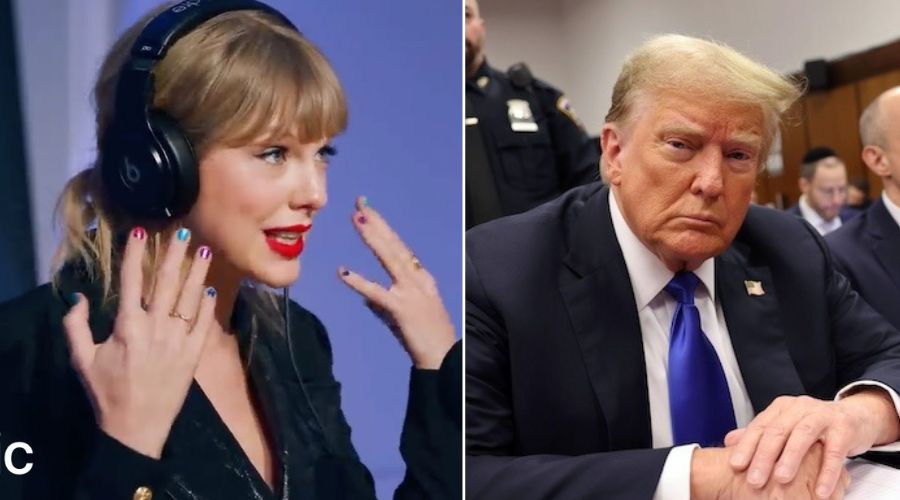CELEBRITY
Taylor Swift Reacts as Supreme Court Issues Emergency Injunction Blocking President Trump From Using Taxpayer Funds to Cover ACECO’s Unpaid Demolition Costs – Saying: “Didn’t Karolyn Claim the Ballroom Was Funded by Private Donors? Didn’t That Include the Demolition? Why Should We the People Pay Anything?! Audit the Treasury and Find Out How Much Has Been Stolen!”

Taylor Swift’s voice rose sharply across social platforms today after the Supreme Court issued a rare emergency injunction blocking President Donald Trump from using any taxpayer funds to cover ACECO’s massive unpaid demolition balance and compensation—costs the company won in court after years of bitter legal back-and-forth. The ruling, which landed like a political earthquake in Washington, immediately set off an avalanche of reactions, but none hit harder or spread faster than Swift’s fiery public critique. The pop superstar didn’t hold back for a second, demanding answers, transparency, and accountability from the people in charge of America’s money.
For Swift, the issue wasn’t just the injunction itself—it was the reasoning behind why such a move became necessary in the first place. Her reaction zeroed directly into a central question: Why was the administration trying to use taxpayer funds for something that the public was told had already been privately financed? Swift brought up the viral statement from Karolyn, who previously claimed that the ballroom in question—along with its demolition, reconstruction, and all associated costs—was paid for entirely by private donors. If that claim was true, Swift asked, then why is the government suddenly on the hook for ACECO’s unpaid demolition bill? Her comments immediately ignited a fresh wave of skepticism and anger online, where many Americans echoed her disbelief: What exactly is being paid for, and who is benefiting?
Swift didn’t just question the contradiction—she called it out with rare bluntness. Her message was sharp, almost surgical: “Didn’t Karolyn claim the ballroom was funded by private donors? Didn’t that include the demolition? Why should we the people pay anything? Audit the Treasury and find out how much has been stolen.” Those lines spread rapidly, carried by fans, critics, and political commentators alike. To millions, they felt like the frustration they’d been holding in for years suddenly had a voice powerful enough to shake the table. Swift’s words weren’t just a celebrity opinion—they were a rallying cry demanding honest accounting in a system that often seems to thrive on secrets.
The Supreme Court’s injunction only intensified those questions. It suggested, at least implicitly, that there were urgent legal concerns surrounding the attempt to use federal money for ACECO’s costs—concerns significant enough for the highest court in the nation to intervene immediately. Legal analysts pointed out that emergency injunctions are not issued lightly; something about the request must have raised red flags. And now, with Swift putting public pressure on the situation, those red flags are no longer confined to the courtroom. They’ve exploded into the public consciousness, forcing politicians to respond, clarify, or defend choices they hoped would go unnoticed.
Within minutes, hashtags demanding accountability began trending, with thousands of users calling for a deeper investigation into the Treasury’s role in the attempted payment. Swift’s demand for an audit didn’t feel like a celebrity overstepping into politics—it felt like a citizen asking the same question millions of Americans ask every time money disappears behind government curtains. Her words struck a chord because they cut through the political spin and went straight to the heart of public concern: Who approved this? Why was it hidden? And how many similar transactions have slipped past without scrutiny?
The conversation quickly expanded beyond ACECO’s demolition bill into a broader debate about transparency in national finances. Commentators pointed out that if a single demolition project could carry this much confusion and misdirection, it raised unsettling questions about larger budget decisions—ones that often involve billions, not millions. Swift’s involvement only intensified the pressure, because her influence doesn’t stop at entertainment; it shapes culture, conversation, and public awareness. When she speaks, especially on issues tied to justice or fairness, people listen.
As the news continues to unfold, the administration is now facing a wave of public skepticism unlike anything it anticipated. The Supreme Court’s injunction halted the payment, but Swift’s words ignited something even more powerful: a collective demand to know what else is being quietly pushed through government systems without public understanding or consent. For many Americans, her outcry felt like a moment of clarity—a reminder that accountability doesn’t belong to one political side or another; it belongs to the people who fund the system in the first place.
And in the middle of that rising storm stands Taylor Swift, refusing to sit quietly while taxpayer money is tossed around behind closed doors. Her message is simple and unmistakable: if something doesn’t add up, the public deserves to know why. And until every question is answered, she’s not backing down.





















